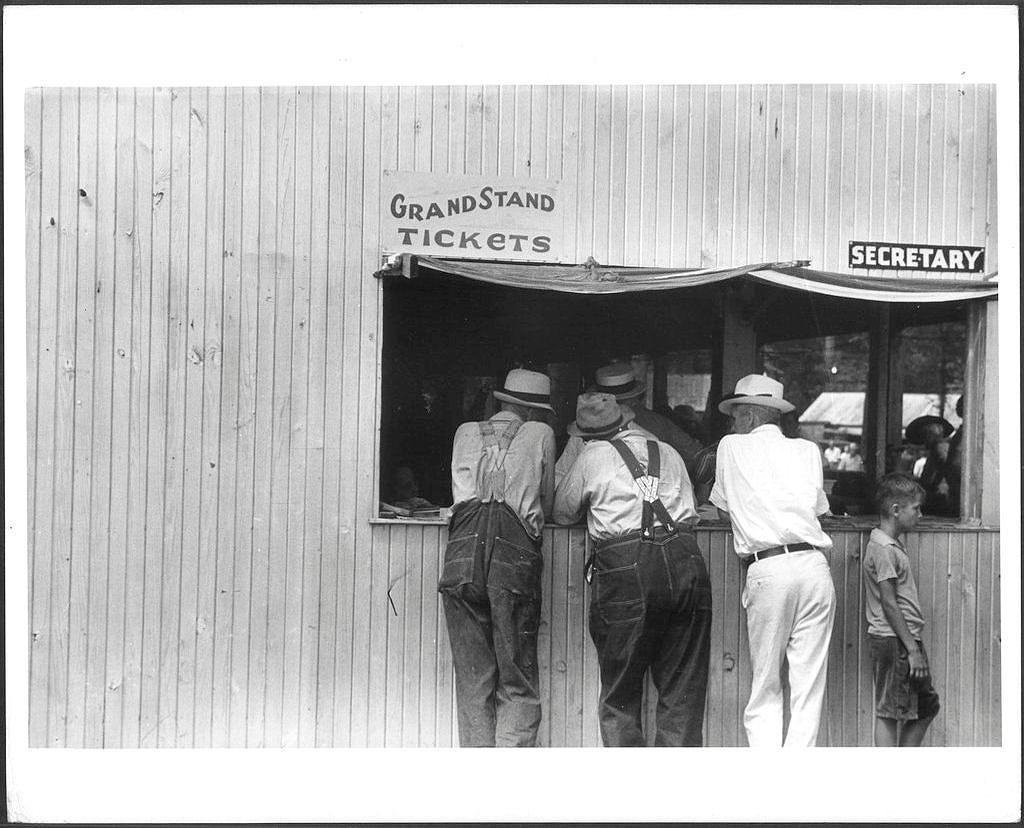FairWeather

Ben Shahn:
Untitled [county fair, central Ohio] (August 1938, printed later)
"Nostalgia seems a much more reliable companion …"
©2022 by David A. Schmaltz - all rights reserved
Summer's finished. It just doesn't quite realize it yet. As if to demonstrate its remaining vitality, the temperature pushed a hundred again, but the people long ago grew accustomed to even that extreme. They stream to the Fair, regardless. So do The Muse and I. We come to work the Democrat booth, a fabled responsibility. Occasionally, some delusional Q fan or Trump supporter has been known to wander by and harass whomever's working the booth, so we're wary. Cowboys wander by with smirks on their faces and "Brandon" on their lips, quietly shaking their heads as they pass. Our people stop by carrying their enthusiasm with them, grateful for our presence. It's not paranoia if they're really out to get you. They're really out to get us.
The booth has a grandstand view of the fair's entrance, a broad sidewalk where everyone entering must pass. We christen it The Chute in recognition of the get-ups we witness passing. The usual teen-agers waddle in wearing unaccustomed boots and the shortest of shorts and cut-off tank tops, jail bait. Middle-aged men enter on pipe cleaner legs supporting grizzly bear bodies, each one sporting a cardboard cowboy hat and pointy-toed boots never intended to be walked very far in. They look from our distance like they're wearing mid-healed ballet slippers and prancing. Many limp already. I spot a grandma's tramp stamp peeking out from a weary bare midriff. I quietly swear to start the Wheat Belly Diet as prodigious bellies seem to dominate this parade. A few patrons defy gravity. Almost no-one isn't overweight.
This fair seems a shadow of its previous selves. In my youth, it teemed. Now, it seems constrained, too clean to be considered respectable, everything miniaturized and tamed. When I was fifteen, the fair seemed downright dangerous. The townies and the farm kids, always contentious, produced a palpable tension between them. Old men tottered between farm implement displays and animal barns, while their wives hung inside the pavilion, which always seemed on the edge of falling or burning down. Everything smelled of animal dung and sawdust. Now, the Fair smells only of over-heated pavement, like any city street.
This place used to be wild. Now, it's tamed. After more than a hundred and fifty years of practice, it seems to have caught up with itself, a terrible fate. Each year, some country performers nobody's ever heard of take to the stage. A demolition derby comes the second night. A rodeo on the third, though my family never once attended the rodeo. We weren't horse people, but townies. We'd go for the rides and the homemaking displays, my mom often entering one of her paintings or something she'd sewn. She seemed so proud of her accomplishment, even if it didn't garner a ribbon. I'd wander through the animal barns, eyeing the farm kids blow drying their cow or sheep for an upcoming competition or stumble down the midway, never once playing any of the rigged games, not wanting to win anything I'd need to carry for the rest of the day.
I'm of the opinion that we've, as a nation, become altogether too civilized. Oh, I well understand that we've lately demonstrated anything but civility toward each other, but our grumbling might emerge from feeling too controlled, too previously planned for, insufficiently wild. We require a certain latitude. We should be able to get into some trouble when we really need to, and humans need some trouble to thrive. We need contention between ourselves and our environment. It helps if we're surrounded by some hostility, if we might really be threatened if we're not on guard. We ache for irresponsibility and being good all the time can kill us the worst way, by attrition, by satisfaction, by satiation. Our bellies eventually burst! I feel reassured that they're still selling bricks of curly fries about the size of a loaf of bread, and those ice cream bars cut from half gallons and dipped into chocolate and rolled in nuts, salvation on a stick. We buy none of it, though. I fully satisfied my rides gene when I was fifteen, now no longer tolerating being shaken, stirred, or fried.
The Muse and I stroll through the place, the only ones we see wearing masks. We linger long enough to watch a woman dance with lighted hula hoops. She's very talented, posing upside down on bare asphalt, never once losing her grip. They fixed the pavilion. It no longer looks as though a stiff wind could knock it down. It no longer seems dangerous to enter, so we stay outside. We thought we might snag some supper as we strolled through, but we found nothing which seemed all that edible, especially given the masks. I leave outraged at having found yet another old reliable anchor of my youth defiled. I'm telling you, this future takes some serious getting used to. Nostalgia seems a much more reliable companion, rarely disappointing. Onward, or something.


